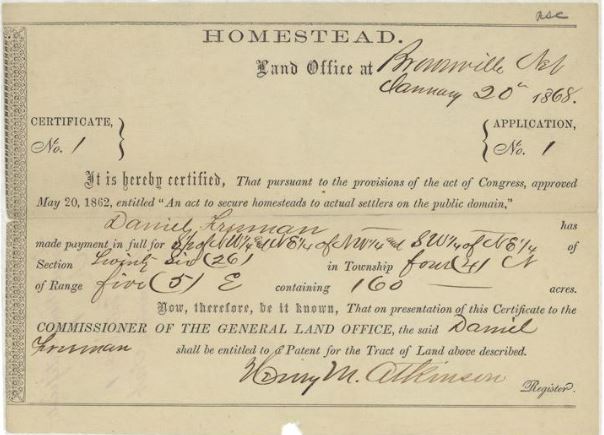
Land Entry Case Files and Related Records
Introduction
The land records that are generally of most interest to genealogists are the land entry case files. These are records that document the transfer of public lands from the U.S. Government to private ownership.
There are over ten million such individual land transactions in the custody of the National Archives. These case files cover land entries in all 30 public land states.
The case files were filed as either military bounty land warrants, pre-1908 general land entry files, or as post-1908 land entry files. The information required to access and order copies of the records will differ depending on which of these 3 categories the transaction falls into.
- Learn how to access these records
- For more background information and an overview of important terminology, review Research in the Land Entry Files of the General Land Office
For land records in the remaining 20 states that were never part of the original public domain, check the State Archives for that particular state. This includes the original 13 colonies, plus Hawaii, Kentucky, Maine, Tennessee, Texas, Vermont, and West Virginia.
Frequently Asked Questions about Land Records
Related Land Records
Tract Books:
There are also tract books available relating to the land entry case files. These are arranged by the legal description of the land: by township, range, and section. Tract books are divided into two geographical areas, Eastern States and Western States.
For the Western States, the tract books are located in the National Archives Building in Washington, DC and some NARA Field Offices. This includes the states of: Alaska, Arizona, California, Colorado, Idaho, Kansas, Montana, Nebraska, Nevada, New Mexico, North Dakota, Oklahoma, Oregon, South Dakota, Utah, Washington, and Wyoming.
For the Eastern States, the Bureau of Land Management (BLM) has the tract books and patents. This includes the states of: Alabama, Arkansas, Florida, Illinois, Indiana, Iowa, Louisiana, Michigan, Minnesota, Mississippi, Missouri, Ohio, and Wisconsin.
For these Eastern State tract books, contact:
Eastern States Office, Bureau of Land Management
Department of the Interior
20 M Street, Suite 950
Washington, DC 20003
Land Patents:
Land patents are the legal documents that transferred land ownership from the U.S. Government to individuals. Now you can search for land patent records online, for both Eastern and Western states. See the Bureau of Land Management's Land Patent Search page.*
*Please note that this includes only patented or completed land entries. Those case files that were cancelled or relinquished will not be there. Even though the entry was never patented there can be as much information in these case files as patented files. To start your search for these records please contact the National Archives facility that holds records for that state.
How Land Records Can Help You:
These records can be useful for historical, legal, and genealogical research, but are most basically transaction records: they form the foundation of the title chain of land ownership. Additional research is needed to identify subsequent title owners and should be conducted in city, county, and state repositories. Depending upon the type and time period of the land entry, the case file may yield only a few facts already known to the researcher or it may present new insights about ancestors, family history, title, and land use issues. For example, the records may attest to one's age, place of birth, citizenship, military service, literacy, and economic status, and may even include similar information about family members. But even the smallest case files can establish locations of land ownership or settlement and dates essential to utilize other resources at NARA, such as census, court, and military service and pension records.
For more information, see Research in the Land Entry Files of the General Land Office (Record Group 49)
Other Select Topics in Land Records
- The Homestead Act of 1862, Background
- Search for Selected Land Records in the National Archives Catalog
- See a Sample Homestead file (for Charles Ingalls)
Indices for Land Records Held in Kansas City
- Name Index to Cancelled, Rejected, and Relinquished Land Entry Files for Dodge City and Topeka, Kansas
- Land Tract Volume List , Kansas and Missouri, ca. 1821-1920
-
Name Index to Cancelled, Rejected, and Relinquished Land Entry Files, Alliance, NE ca. 1869-1950
-
Name Index to Cancelled, Rejected, and Relinquished Land Entry Files, Broken Bow, NE ca. 1902-1918
-
Name Index to Cancelled, Rejected, and Relinquished Land Entry Files, Lincoln, NE ca. 1905-1933
-
Name Index to Cancelled, Rejected, and Relinquished Land Entry Files, North Platte, NE ca. 1902-1922,
-
Name Index to Cancelled, Rejected, and Relinquished Land Entry Files, O'Neill, NE ca. 1900-1918,
-
Name Index to Cancelled, Rejected, and Relinquished Land Entry Files, Valentine, NE ca. 1907-1918
-
Digitized Nebraska Related Records circa 1850 - 1919
